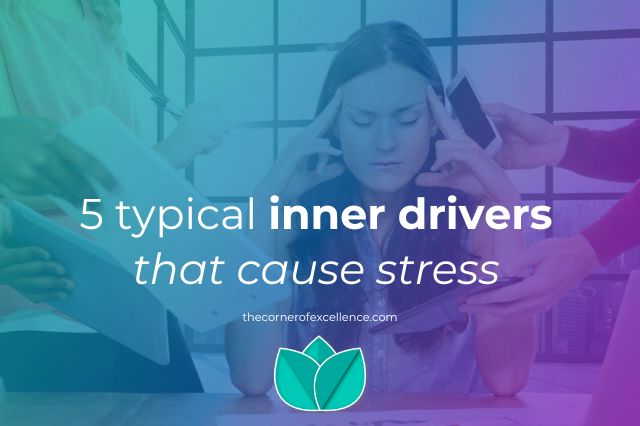
Each of us tends to stress in different situations. Due to our personality, our beliefs and experiences, what does not concern one person stresses the other and vice versa. That is because of five inner drivers that cause us stress. Let us see what this all about, go through each of the inner drivers, and of course, how you can learn to stress less.
What are the inner drivers that cause stress
These are drivers that lead us to react and act in a certain way. They are beliefs that we have turned into orders that we give ourselves. They can be helpful in developing qualities and skills.
The problem arises when we let ourselves be pushed too hard by them. When we are not aware of these inner drivers, they can lead us to demand too much of ourselves. Then these inner drivers rob us of quite a bit of energy and cause us stress.
What the five inner drivers that cause stress have in common is the search for acceptance, appreciation, recognition, and love. But when they are born from insecurity, limiting beliefs and fears, they can lead us to seek those sensations in the wrong way.
Which are the 5 typical inner drivers that cause stress
Basically we can differentiate five inner drivers for our way of acting on a personal and professional level. We are all pushed by any of the five in varying degrees.
Let us go through those typical triggers, how to recognise them, and how to keep them at bay if they are causing you stress.
1. Be perfect
This inner driver is based on the belief that you cannot make mistakes. You are very demanding with yourself and others. Everything must be perfect and you must do everything perfectly. Being only yourself, you do not deserve the love and appreciation of others.
You tend to give more explanations than necessary and justify yourself. You anticipate criticism. Relationships with perfectionists can be marked by a lack of closeness and a sense of subservience. The perfectionist knows everything better, is critical and can make others feel that they are not enough. Relationships tend to seem like a competition of achievement and who is better.
On the positive side is that thanks to your beliefs you have developed qualities such as precision and meticulousness. On the negative side is the risk of not finishing jobs because they are never perfect. Or not even starting something for fear of making it less than perfect.
It is worth mentioning that there are also perfectionists who wish for an ideal world. As they have realised that it is impossible, they have resigned themselves to a behaviour of “nothing matters”. Cynics are often hopeless idealists affected by this inner driver of perfectionism.
How to disarm the inner driver ‘be perfect’
First of all I suggest that your new mantra be: ‘I am enough just the way I am’. Remember that no one is perfect and that it is an unattainable illusion.
Then pay attention to each time the inner driver appears. Ask yourself why you feel the need to make it perfect at that moment. Consider whether it is better to get it done and feel productive.
Also, consciously give yourself permission to make mistakes.
Some ideas for permissions to give yourself can be:
- I can make mistakes and learn from them.
- 90% is also enough.
- I will do my best and that is enough.
- I am good enough just the way I am.
- The appreciation of others does not depend on my performance.
- I am charming and I deserve appreciation just the way I am.
2. Be strong
If you let yourself be carried away by this driver, you resist showing your feelings. You show no pain. It is also hard for you to ask for help. You feel like you have to do it all alone. You think that showing your feelings is a sign of weakness. Needing help from others is a sign of dependency.
You feel like you have to play the hero. Giving up without a fight is not an option. On the positive side, you will have become a strong, autonomous and persevering person. Someone who knows how to fight for what they want despite possible obstacles and who does not give up easily.
On the downside is that the ‘be strong’ driver can become a burden. Possibly you fear not being stable in highly-emotional situations. You have created a shell to protect yourself. But that armour distances you from others. That is why your desire to feel welcomed, protected and cared for is not satisfied.
How to disarm the inner driver ‘be strong’
To reduce the burden and stress of this driver, first realise that showing emotions and feelings is not a sign of weakness. It actually takes more fortitude to be vulnerable. On the other hand, remember that humans are social animals and everything that has been achieved throughout history is based on teamwork.
I suggest you try asking someone to help you at least once a week with something you could do on your own. Also, watch when you bottle up your emotions. Try to pay full attention to them, observing without judging what you feel. What does that emotion want to tell you?
Some ideas of permissions to give you are:
- When I show what I feel I am strong.
- I can trust.
- I can open up, show myself as I am and share my desires with others.
- Asking for help does not mean losing prestige or being weak. In fact, I deserve support.
- I can continue to defend my wishes and beliefs strongly.
- I can take off my armour, even if it causes me some discomfort at first.
3. Try hard
This inner driver pushes you to always give your best. You think that only if you make the maximum effort, you can do things really well. You think that who does not give up can achieve anything. But also that work cannot be fun. Achievements obtained without effort have no value. In fact, you measure things by the effort and not by the result.
On the positive side you have become someone persistent and persevering. You are not afraid of effort and you start projects with energy. You work with tenacity, rigour and patience.
The risk is that you lose sight of the result. As you focus on the effort, you forget to reap the achievements. You focus more on quantity than quality. Also, you forget to manage your time. You give more importance to being busy making an effort than to productivity.
How to disarm the inner driver ‘try hard’
If you want to keep this inner driver at bay, I suggest that your new mantra be: ‘Work smart, not hard’. In other words, work smarter and more productively instead of hard. Give yourself permission and find a way to have fun with your work. Also try to find the easiest, most efficient and effective way to perform tasks.
Then it can be a good idea to make a list of your achievements and projects that you have brought to fruition. What skills did you use for that? Keep the list handy so you can refer to it from time to time, both for motivation and to add new achievements.
From now on pay attention to your progress, goals and achievements. Congratulate yourself for them. Also, set realistic goals and milestones that you can celebrate as you achieve them. As well, ask for help from time to time with a task that you could do alone.
Above all, remind yourself often that you can feel lightness and joy. Give yourself permission to enjoy what you do. It may help you to visualise what joy and lightness mean to you. Then find an image that symbolises it and place it in view. Or find songs that give you that feeling and save them so you can listen to them whenever you want.
Last but not least, take time for breaks, to do nothing or do things that do not involve effort but are fun.
Some ideas for permissions to give yourself are:
- I can enjoy the work and make it easier for me.
- Even if it is easy and fun, it has value.
- I decide what to put my effort into.
- I can let myself be helped.
- Also, I can enjoy my progress and achievements. With each completed task my satisfaction and serenity increase.
- I deserve to relax and rest. Not everything is work and effort.
4. Hurry up
Are you always active and busy? Do you think you cannot stop and you should always keep going? Then this inner driver affects you. You think you cannot waste your time or else you will miss important things. Therefore, you feel the urge to do things fast.
You may seem frantic and fast-paced to other people. On the other hand, you get stressed when others seem slow or seem to waste their time.
On the plus side you are a worker who manages to tackle a high volume of work. You show how many things can be done if one wants and sets their mind to it.
On the negative side you run the risk of being more busy than productive. You forget to work better instead of working more. Also, you do not take time to process your experiences. That is why you forget to extract learnings that can help you avoid mistakes and do things better next time.
You can also miss out on valuable experiences by always having your mind in the future. Due to always thinking about the next thing to do, instead of paying attention and enjoying what is happening and what you are doing right now.
In conversations you want to tell as much as possible in the shortest possible time. You tend to interrupt others and speak rapidly.
For all this, you can be stressful to those around you because of your frenetic pace.
How to disarm the inner driver ‘hurry up’
To keep this inner driver that stresses you and others at bay, you need to find the right rhythm for your activities. It also requires finding a balance between activity and rest.
Being able to do a lot and do it fast is great. But, on the one hand, try to do the right things. That is, prioritise and decide which activities and tasks are important. To do this, take time to review and plan. And remember the Pareto principle: 20% of the activities bring 80% of the results.
On the other hand, before undertaking a task, ask yourself what is the correct pace to perform it diligently. Finishing a task too quickly can waste time later if it requires corrections or fixing blunders. As well, when you feel pushed by urgencies, take a moment to assess them.
Also, train your patience and learn to pay more attention to the present moment. Practice doing your activities mindfully. I also suggest you try meditation, mindfulness exercises, contemplation, breathing exercises, or yoga.
Also, try to take breaks. If necessary, reserve time for breaks in your agenda.
As for your relationships with other people, practice active listening. Instead of worrying about everything you want to tell, focus on what the person you are speaking to transmits to you.
Some ideas for permissions to give yourself are:
- I am the owner of my time.
- That means I can decide if and when to hurry.
- I can take the time I need; feel and follow my rhythm. This is how I give meaning to my life.
- I can take breaks.
- It is okay to miss certain things. I can rely on being at the right place at the right time.
- If I pay more attention to the present, I will discover things that I used to overlook.
- I will be more interesting to other people if I pay attention to them and listen carefully.
- When I feel impatient, I will take a moment to listen to my body and breathing.
5. Please others
If this is your inner driver, you are always friendly and try to create an environment of harmony. You put the welfare of others ahead of your own. You care more about being accepted than defending your own interests. As you want to please everyone, you have a hard time saying ‘no’.
You believe that to be valuable you have to serve the welfare of others. That you and your rights are less important.
The positive side of this driver is that you have become a caring, compassionate, loyal and altruistic person. You make others feel important. You are an empathic person who knows how to detect the needs of others. As well, you know how to adapt.
The problem is that you probably tend to forget yourself. You do not give enough importance to yourself, your well-being and your rights. Also, you have become so accustomed to adapting that your identity development may have fallen short. You do not dare to express your rights, opinions and needs. Therefore, there are probably people who take advantage of your good will.
How to disarm the inner driver ‘please others’
Constantly worrying about others and trying to avoid all kinds of conflicts is stressful. Disarming this driver that stresses you requires first of all realising that you are important and valuable. You are the most important person in your life. If you feel good you will transmit it around you.
Therefore, it is key that you work on your self-love, self-esteem, self-confidence and self-acceptance. It might be a good idea to make a list of all your qualities, strengths, and accomplishments. Think about what makes you special. Which are your interests and passions? What do you like to do but do not because you are too busy pleasing others? What could you do to take better care of yourself?
It is also important that you remember your assertive rights and train your assertiveness. This means that you practice expressing your opinion and your needs. Also, pay attention to how you express yourself. Do you usually weaken what you think? You might say things like:
- “Maybe I am wrong but I think…”
- “Shouldn’t we do this today?” instead of “I would like to do this today”.
Practice expressing directly what you think and want.
Lastly, stop several times throughout the day and ask yourself: ‘If it were only up to me, would I still do it?’ If not, why do you do it? What does it bring?
This exercise will help you learn to prioritise and find a balance between the interests of others and your own.
Some ideas for permissions to give yourself are:
- I can take my needs and opinions seriously.
- Although it makes me uncomfortable at first, I can express what I need. Others do so, too.
- Considering myself and my well-being a priority is not selfish.
- I can take care of others without neglecting myself. If I am well, it will positively affect others.
- I do not have to be liked by everyone. There are enough people who appreciate me.
- I will be able to cope if someone is unhappy with me.
- I do not have to agree with everything. Although it makes me feel uncomfortable, conflicts are sometimes unavoidable.
- To say ‘yes’ from the heart requires knowing how to say ‘no’.
Which of the inner drivers cause you stress?
In which of the inner drivers have you recognised yourself? What do you think is the origin and purpose of this driver? What are you going to do to keep the positive part of the inner drivers but to disarm the negative part?

Sharing is caring!




